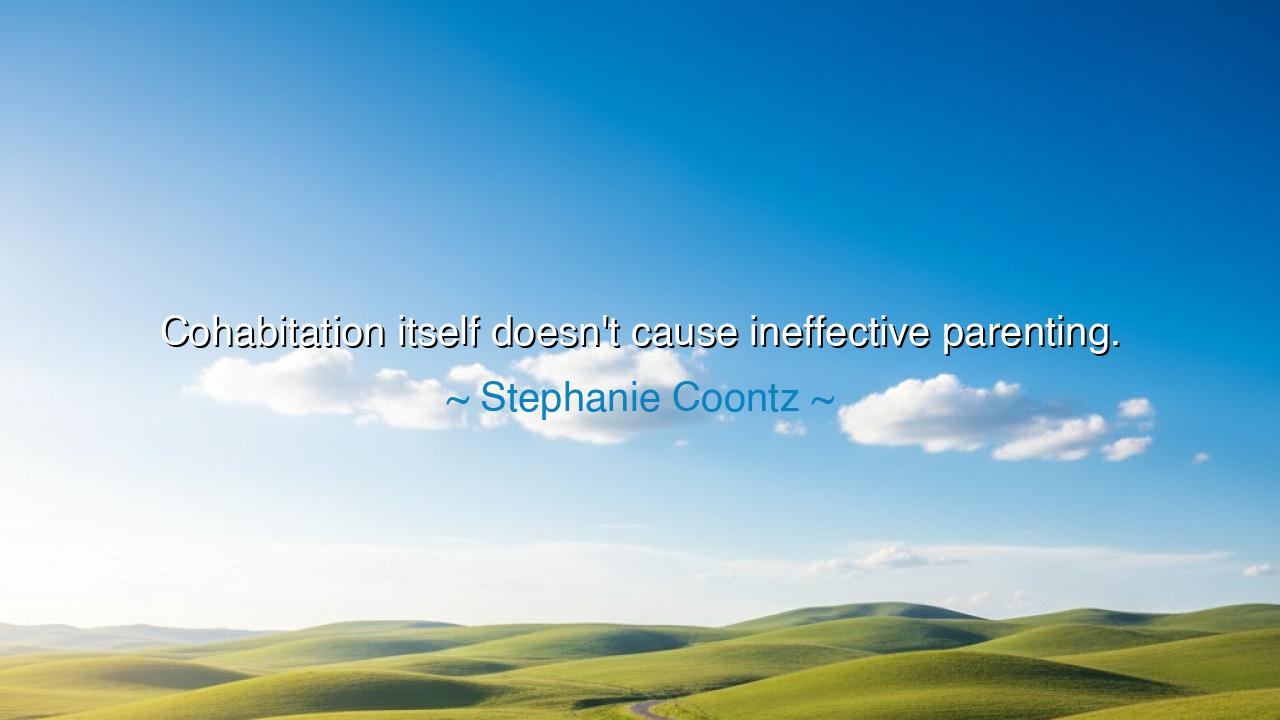
Cohabitation itself doesn't cause ineffective parenting.






Hearken, O children of generations yet to come, and attend to the clarity of wisdom offered by Stephanie Coontz, who declares: “Cohabitation itself doesn't cause ineffective parenting.” In these words lies a truth that pierces the veil of judgment and assumption: the effectiveness of raising children is measured not by formalities, titles, or structures of union, but by the love, attention, consistency, and guidance invested by those who nurture. A household’s strength lies in care and intention, not merely in its outward form.
The origin of this reflection rests in Coontz’s studies of family structures across time and culture, observing that children thrive in a multitude of domestic arrangements when nurtured with devotion and responsibility. She notes that societal assumptions often equate cohabitation with instability or inadequacy, yet the empirical evidence demonstrates otherwise. What shapes the child is the quality of parental involvement, moral guidance, and emotional support, not the ceremonial or legal status of the guardians.
The meaning of her words is both profound and practical. To assert that cohabitation alone does not cause ineffective parenting is to liberate parents and society from unfounded prejudices. Effective parenting is characterized by presence, attention, empathy, and ethical guidance, and these qualities may flourish within married, cohabiting, single, or extended households alike. Coontz teaches that the nurture of the young is an art that transcends the boundaries of tradition, emphasizing the substance of care over its form.
Consider the example of John Adams, whose family life included both formalized duties and collaborative domestic arrangements. His children thrived not because of legal formalities, but because of the intentional guidance, moral instruction, and presence of both parents. The union’s form was secondary to the cultivation of character, intellect, and resilience. Coontz’s observation resonates with this historical truth: the measure of parenting lies in action and engagement, not ceremony or outward structure.
Yet Coontz’s reflection also carries a subtle admonition: society must refrain from conflating moral judgment with domestic form. To presume that cohabitation, rather than care and guidance, determines a child’s flourishing is to misplace responsibility and invite injustice. Children require stability, nurture, and attentive guidance, and these qualities can be present in diverse family arrangements. Wisdom lies in recognizing that parenting transcends societal expectation, rooted in the deliberate labor of love and guidance.
The lesson for future generations is radiant: cultivate effective parenting through attention, consistency, and moral engagement, regardless of formal titles or societal labels. Seek to nurture, guide, and protect, rather than conform to rigid norms or fear judgment. Children flourish when cared for with intention, compassion, and reflection; the form of union is but a vessel for these enduring virtues.
In practical life, one may follow Coontz’s counsel by focusing on quality of interaction, moral guidance, and emotional support. Foster relationships grounded in trust, respect, and consistency. Prioritize presence, attentive listening, and active mentorship in daily life. Provide children with stability, love, and guidance, while embracing the flexibility of diverse household arrangements. By this, one nurtures strength, virtue, and resilience in the young, transcending the constraints of formality.
Thus, O children of future ages, carry this teaching as both lantern and compass: cohabitation alone does not determine the success of parenting. Attend to the substance of care, the quality of guidance, and the depth of attention. In this deliberate cultivation lies the enduring strength of families, the flourishing of children, and the legacy of wisdom, love, and moral courage that shall illuminate generations yet to come.






AAdministratorAdministrator
Welcome, honored guests. Please leave a comment, we will respond soon